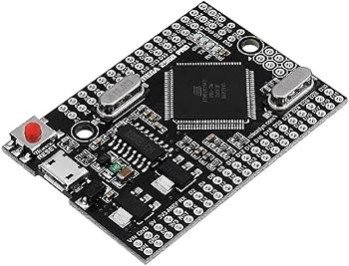Product Description (Detailed):
Unlock the power of the Arduino Mega in a dramatically smaller footprint with our Arduino Mega Pro Mini CH340 – ATmega2560 Development Board. This highly efficient and compact board is the perfect solution for projects that demand the extensive I/O capabilities and memory of the ATmega2560 microcontroller but require a more space-conscious design than the standard Arduino Mega.
At its core, the Arduino Mega Pro Mini is powered by the same robust ATmega2560 microcontroller found in the full-sized Mega. This means you get access to an impressive 54 digital I/O pins (15 with PWM capabilities) and 16 analog input pins, along with 256KB of Flash memory, 8KB of SRAM, and 4KB of EEPROM. This abundant I/O and memory make it ideal for complex projects involving numerous sensors, actuators, motor drivers, and intricate logic that would overwhelm smaller Arduino boards.
The "Pro Mini" designation signifies its compact design, typically measuring around 38mm x 55mm. This significantly reduced size makes it an excellent choice for embedded applications, custom PCBs, and portable devices where space is at a premium. The board utilizes the reliable CH340G USB-UART converter chip, which provides stable and fast communication with your computer via a convenient Micro USB connector for programming and serial debugging. While you might need to install the CH340 drivers (readily available online), this widely used chip offers a cost-effective and dependable alternative for USB connectivity.
Powering the Arduino Mega Pro Mini is flexible; it can be powered directly via the Micro USB port or through dedicated Vin/GND pins with a recommended input voltage range of 6V to 9V DC. Whether you're designing advanced robotics, intricate automation systems, multi-sensor data loggers, or complex industrial controls, the Arduino Mega Pro Mini CH340 offers the power and versatility of the Mega 2560 in a compact, embeddable package.
The Compatible Arduino Mega Pro Mini CH340 is a space-efficient version of the Arduino Mega 2560, equipped with the powerful ATmega2560 microcontroller and the CH340 USB driver chip for serial communication. Designed for developers and hobbyists needing the power of a Mega in a compact form, it is perfect for embedded applications, automation systems, 3D printers, CNCs, and complex sensor-driven projects.
It retains the core features of the Arduino Mega—such as high memory capacity, wide I/O support, and hardware serial ports—while offering a smaller footprint that can be embedded into tight project spaces or custom enclosures.
Key Features:
-
ATmega2560 Microcontroller: Powered by the same MCU as the original Arduino Mega for advanced embedded and robotic applications.
-
CH340 USB Interface: Features a reliable and cost-effective CH340 USB-to-Serial converter, compatible with Windows, Linux, and macOS.
-
Mini Form Factor: Ultra-compact size ideal for space-constrained projects, wearables, and portable robotics.
-
Massive I/O Capability: Offers 54 digital I/O pins, 16 analog inputs, and multiple UART, SPI, I2C ports—great for complex hardware integration.
-
Fully Arduino-Compatible: Works with Arduino IDE for seamless uploading, programming, and debugging.
Technical Specifications:
| Parameter |
Specification |
| Microcontroller |
ATmega2560-16AU |
| Operating Voltage |
5V |
| Input Voltage (recommended) |
7V – 12V via VIN |
| USB Interface |
CH340G USB-to-Serial IC |
| Digital I/O Pins |
54 (15 PWM capable) |
| Analog Input Pins |
16 |
| Communication Ports |
4 UART, SPI, I2C |
| Flash Memory |
256 KB (8 KB used by bootloader) |
| SRAM |
8 KB |
| EEPROM |
4 KB |
| Clock Speed |
16 MHz |
| Dimensions (approx.) |
~55mm x 38mm (varies slightly by design) |
| Weight |
~12–15 grams |
| Compatibility |
Arduino IDE, Windows/macOS/Linux |
How to Use:
Connection Steps:
-
Connect the board to your computer via a USB to micro USB or USB to UART cable (depends on board type).
-
Install CH340 drivers (available from official source or included in Arduino IDE).
-
Open the Arduino IDE, go to Tools > Board > Arduino Mega or Mega 2560, and select the correct COM port.
-
Write or upload your code — the board is now ready for robotics, sensors, relays, or IoT modules.
Tips:
-
Use with HC-05 Bluetooth, DHT11, servo motors, relay modules, or TFT displays for complex applications.
-
Perfect for 3D printer control boards (Marlin firmware), CNC drivers, or multi-sensor data loggers.
Applications:
-
Advanced robotics and automation
-
IoT development and home automation systems
-
CNC and 3D printer control (e.g., Marlin firmware)
-
Data logging and industrial sensor integration
-
Prototyping large-scale embedded systems
-
Multi-device serial communication setups
Package Includes:






















